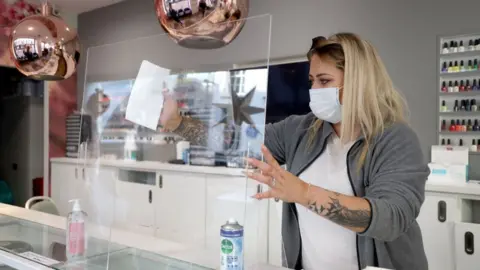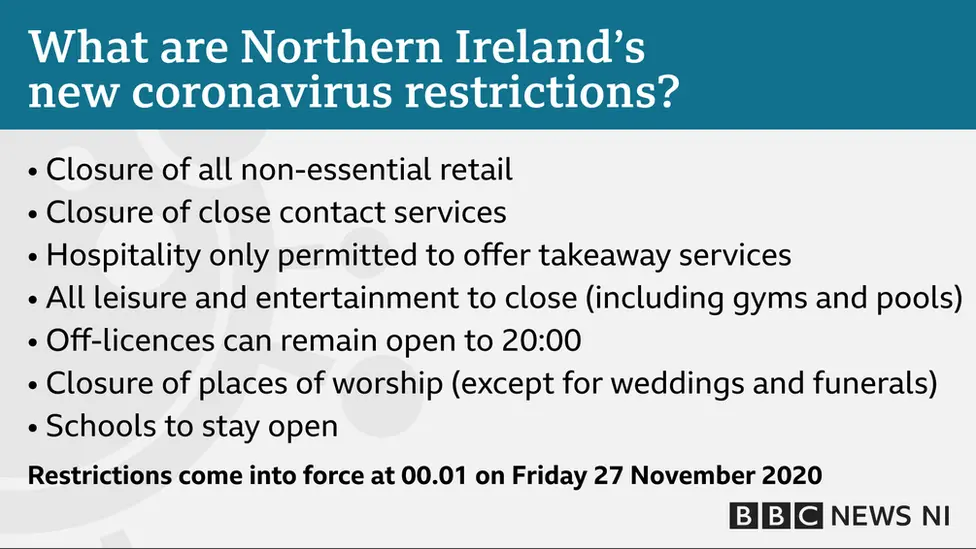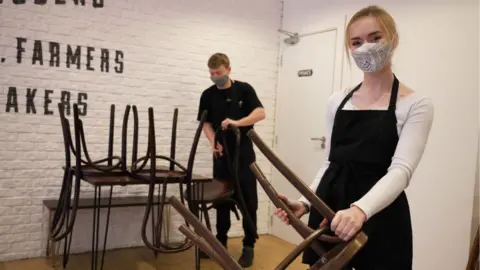Coronavirus: NI to face new lockdown measures from next Friday
 Pacemaker
PacemakerNorthern Ireland is set to face a two-week period of tougher Covid-19 lockdown measures from next Friday.
Non-essential retail will have to shut, and the hospitality sector will have to remain closed.
The measures were agreed by the executive on Thursday. Schools will be allowed to stay open.
Close contact services can reopen this Friday, but will have to close again on 27 November.
The executive met on Thursday after Health Minister Robin Swann warned more restrictions were necessary by the end of November.

He said otherwise, a full lockdown in mid-December would not be enough to prevent hospitals from becoming overwhelmed.
The measures agreed by ministers are extensive and will include:
- Closure of all non-essential retail
- Closure of close contact services such as hair and beauty salons and driving instructors; exemptions for those in film and TV production, those involved in health and social care services and elite sport services
- Hospitality will only be permitted to offer takeaway services - food and drink in motorway services, airports and harbour terminals remain open
- Closure of all leisure and entertainment to include soft play areas, gyms, golf courses, tennis courts, fitness studios and swimming pools
- Sporting events only permitted at elite level and to be played without spectators
- Closure of places of worship with exceptions for weddings, civil partnerships and funerals - the maximum number present will remain at 25
It is understood that close contact services and coffee shops that are due to reopen on Friday can still do so - but only for one week.
If they do not want to, it's believed they will be able to access financial support for staying closed.
The executive is set to develop more financial support packages in the next few days.
 Pacemaker
PacemakerOff licences will be allowed to remain open, but will have to close at 20:00.
No household gatherings of more than one household, other than current bubbling arrangements, will be permitted with exceptions for caring, maintenance, house moves.
Schools and childcare will remain open.
Public parks and outdoor play areas will also be permitted to stay open.


These restrictions are much tougher than the ones the DUP rejected just one week ago.
Then they vetoed the health minister's plans using the controversial cross-community vote - not once, but twice.
Now from next Friday, Northern Ireland will revert back to similar measures introduced in March, with the exception of schools remaining open.
None of the parties appeared for interview this evening to explain the move, but naturally it's a huge blow to those who hoped they had the green light to reopen.
Health officials will be relieved ministers have taken their advice on board, but this move only takes Stormont to the middle of December.
Further restrictions after that haven't been been ruled out, but the executive says what it's doing now represents the best chance of getting us to Christmas.

The executive took the decision to introduce the circuit breaker from next Friday, after modelling showed it was the "best time to introduce restrictions and avoid the likelihood" of further measures before Christmas.
Ministers were told on Thursday that the R-number - or transmission level of the virus - has settled at around one, but that hospital inpatient numbers are still sitting at a higher level than the first wave.
The stay at home message will remain as strong guidance.
It is understood a potential proposal to put travel restrictions into legal force did not get much support around the executive table and it was felt it would be too difficult to enforce.
The executive has said liaisons with the PSNI on visibility will continue.
What has the executive said?
First Minister Arlene Foster, whose party the DUP had blocked proposals to extend some restrictions last week, said it was not a position the executive "had hoped to be in", with the regulations due to end next week.
"The R rate has unfortunately not dropped as far, or for as long, as had been estimated. We have taken some time today to look at the reasons for this. Sadly it is clear that a careless minority have significantly undermined the sacrifices of the many," she said.
"So I want to take this opportunity to say to those who feel it's acceptable to flout public health advice, think again.
"We all need to work together to save our hospitals, to save Christmas, to save lives."
Deputy First Minister Michelle O'Neill said the interventions agreed on Thursday night were "difficult but necessary" to avoid hospitals being overwhelmed in the run-up to Christmas.
In a video on social media, she said the impact of the virus had been "brought home" to her, after a relative of hers had died with Covid-19 overnight.
Health Minister Robin Swann, who had been urging the executive to agree to tighter measures, said he wanted to thank his colleagues for supporting the recommendations.
This virus has tested us all across society in ways we have never been tested before," he said.
"Nowhere has the pressure been more severe than in our health and social care system.
"All of us now have to work really hard to achieve a happier festive season. Please follow the public health advice and stay at home. Let's all redouble our efforts and look after each other."
How have business leaders reacted?
Simon Hamilton, chief executive of the Belfast Chamber of Commerce, said trust in the executive was now at "rock bottom", as a result of the decision taken to close non-essential retail again.
Allow X content?

He said: "The decision to close retail is probably the biggest boost to online shopping in Northern Ireland since the invention of the internet.
"It cannot be understated what damage a decision to close shops at this time will do to jobs."
While Glyn Roberts of Retail NI warned the decision would "kill small businesses, rather than the virus".
"In the next week, we will see a huge rush of shoppers to our high streets, which clearly will not help with social distancing," he said.
Aodhán Connolly, director of the Northern Ireland Retail Consortium, said he accepted the executive's decision but said the timing could not be worse.
"November and December are peak trading months and millions of pounds per week will be lost in sales during what should be our busiest period," he said.
"We are asking the executive urgently to provide clarity about the criteria for reopening and to ensure that affected businesses are adequately supported in the coming months."
Hospitality representatives have also criticised the decision to keep their sector closed for another two weeks from next Friday.
Colin Neill of Hospitality Ulster said ministers should not underestimate the "huge amount of anger" across his industry.
"We now expect to meet with the health minister, chief medical officer and the chief scientific adviser tomorrow for an urgent meeting with the hospitality industry steering group to start the process of working a way out of this awful situation," he added.
The decisions to extend the restrictions, which go much further than what had been anticipated, will now expire on 11 December.
